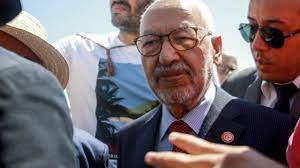The jailed leader of Tunisian opposition party Ennahdha, Rached Ghannouchi, 82, began a hunger strike on Friday (Sep. 28) to protest his detention and express support for other “political prisoners”, his party said.
A court in the North African country sentenced Ghannouchi to one year in prison on terrorism-related charges in May following his arrest the month before, in what his party condemned as an “unjust political verdict”.
He is the most prominent of roughly two dozen opponents of President Kais Saied arrested since February, including former ministers and business figures.
Ghannouchi “decided to begin a three-day hunger strike to denounce the arbitrary and unfounded prosecution of the opposition”, said Imed Khemiri, spokesman for the Islamist-inspired Ennahdha party.
“It is also in support of the hunger strike started by Jawhar Ben Mbarek,” he said, referring to the left-wing opposition figure and leading member of the National Salvation Front (FSN) opposition alliance.
Ben Mbarek, a critic of Saied who has been under arrest since February 24, has been on a hunger strike for four days to denounce his “unjust” detention, according to his sister, the lawyer Dalila Masaddek.
FSN leader Ahmed Nejib Chebbi told a news conference on Friday that Ben Mbarek had started “an indefinite hunger strike until this injustice” is corrected.
“Faced with the government’s determination to dismiss opponents through baseless legal cases, the only option left to political prisoners is to go on hunger strike,” said Khemiri.
Fighting for the release of political prisoners
Ghannouchi, a former speaker of parliament, took the action “to defend the demand for the release of all political prisoners and to put an end to this injustice against them”, Ennahdha said in a statement.
Chebbi expressed concern over Ghannouchi, who was arrested in April after warning that eradicating different viewpoints such as the left or political Islam may lead to a “civil war”.
The Ennahdha leader was “over 80 years old” and had “found himself in the harsh conditions of incarceration”, said Chebbi.
“Today, any political or national figure with independent thought risks prison for any reason whatsoever,” added the NSF head.
He lamented the “collapse” of freedoms in Tunisia “because institutions have been shattered, the constitution torn up, the power monopolised by a single person”.
Chebbi called for mobilisation against the “threat” he said may affect politicians, organised labour, bloggers, businesspeople and civil servants.
Ennahdha was the largest party in the Tunisian parliament until Saied dissolved the legislature in July 2021 as part of a power grab.
Saied has since ruled by decree in the only democracy to emerge from the Arab Spring uprisings that swept the region more than a decade ago.
In March, the European Parliament in a non-binding resolution condemned Tunisia’s “authoritarian drift” under Saied’s leadership.
Africanews with AFP






